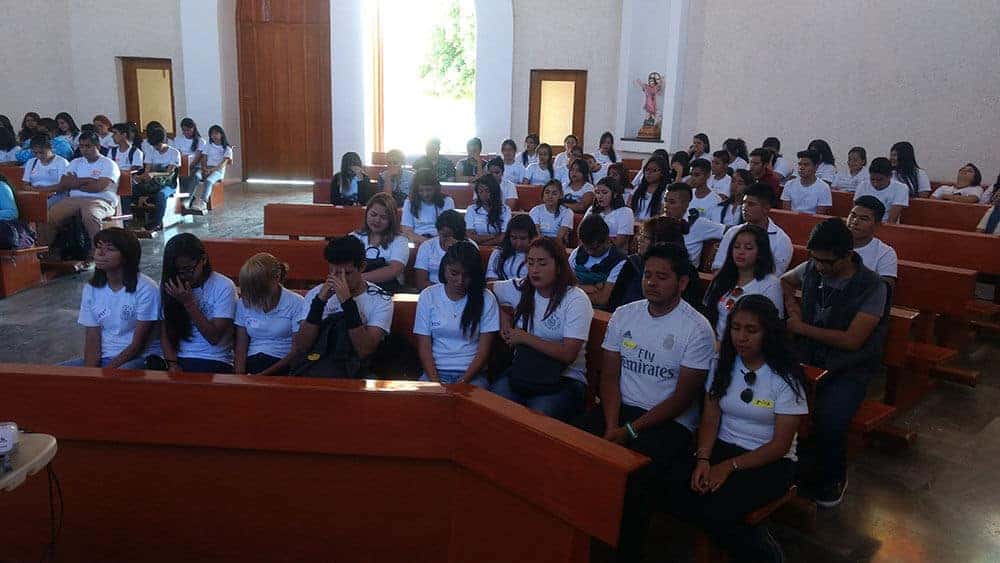The 150th Anniversary of the foundation of the Congregation of the Sisters of Charity of the Incarnate Word, December 8, 2019.
Dear sisters, brothers, friends, collaborators in the missionary work of the Sisters of Charity of the Incarnate Word…. brother priests, children, youth, we are a very good representation of the Church of Monterrey,
First, affectionate greetings to the Sisters here, Superior Sister Tere, (I do not know how they call her; Leader, I do not understand, but I know she is the one in charge of the Sisters). Thanks to all Sisters who could come to accompany the host Sisters from Monterrey.
150 years, I was telling you before Mass, 150 years for one person are too many, but for an institution, it is a very good age. So, we join this joy, this gratitude and I want to invite the Sisters and all those who collaborate to always look forward. Whenever we thank God, we take a look back, and what has to come from our heart is joy and gratitude, but also a lot of hope for the future, a lot of encouragement and enthusiasm, always feeling inspired by those who took the first step That has to cheer us up always.
We look back and we look forward. The challenges are similar, the challenges are always very similar. The charism and mission of the Sisters has its unique source in the Gospel, the person of Christ and “the Word who was made flesh and dwelt among us.” Those words summarize the Gospel, which the Church celebrates all year long, but in a special way at this time of Advent and Christmas. We try to deepen this mystery that always gives the Church the raison d’être of its mission.
Beautifully, St. John in his First Letter says that whoever denies that Christ came in the flesh is the antichrist and the greatest enemy of faith. We learn to value this reality, although small , fragile, limited and sometimes despicable of our humanity, that Christ, the Son of God, accepted and wanted to dwell among us.
The author of the Letter to the Hebrews says: He was not ashamed to call us his brothers and sisters. This is the beauty of the Incarnation, the motivation and the reason for the mission, the first mission. The founding reason for the mission is the Incarnation. God the Father sent His son, Jesus Christ, born of a woman, born under the law, to become a man. That is when the mission begins, in this humanization of God who wants to bring all people to him. The mission of the Church cannot be any other than to humanize because God has wanted to transform, value, make sense of our humanity. As I said, although fragile, although sometimes adverse to God, it is always the great gift that God has given to human beings. That is why we say in the Creed “For us and for our salvation, He came down from Heaven”. Everything always goes back to the origins, the Word made flesh, and what the Lord said at the beginning: “Let us make humankind in our image, in our likeness;” male and female He them in His image.
The mission of the Church is always to continue God’s original plan for the human being. And how are we like God? How are we God’s image? In love. That is why today we hear this precious hymn of St. Paul about love, love is everything, love forms our humanity. In Bishop Dubuis’ letter, he said that the works of corporal mercy had to be lived because Christianity makes history, touches the ground, knows that the human person enjoys and suffers, has health but also pains of disease, lives and dies, is happy and sometimes discouraged, sometimes cheerful, sometimes depressed. All that multifaceted reality is welcomed by Christ and the works of mercy have their roots in the way that Jesus was. Today I want to look at this missionary model proposed by today’s Gospel. First, a compassionate look. There is no work of mercy if there is no compassion. And what does compassion mean? Putting myself in someone else’s shoes, always trying to understand people’s pain, is having a compassionate, merciful look. The first thing Jesus does is to look at human pain, and from there comes something very important, the mission, but the mission in collaboration. Christ could have been alone in the mission but he called others to collaborate with Him. The Gospel even tells us the names of the twelve apostles. He called them to be with Him, to do the mission, because Sisters, no one can do it alone; no one should be alone and the mission demands this collaboration among us. Neither the Bishop alone, nor the priests alone, nor the consecrated sisters alone, nor the laity alone, can carry out this mission. Together we carry out this merciful mission of God; and thank God the same history and life itself puts it before us. We cannot do it alone. What would it be for you without the doctors, without the nurses; what would it be for you without the collaborators in the schools, the teachers, the administrators? God always puts the truth before us that we cannot do it alone; and it is good, because this forces us to make a community endeavor out of the mission, and this does not mean weakness. Complementarity enriches and strengthens us, because sometimes in our clerical, and very religious mentality, we want to be self-sufficient. No. I hear someone telling me, “how nice it was before when all the teachers were religious at school, and now not anymore, what a shame.” No, it’s not a shame! Although they were many, the work is communal, always living in this task in which Jesus gives us a deep teaching: He called twelve to collaborate with Him.
The third idea I really like about this missionary paradigm of the Gospel is prayer: “Pray to the Lord to send more workers to your fields.” Although we all collaborate, we will always be a small number. We need to hand over the reins to others, and we must ask that there be collaborators who fall in love with the mission, always aware that this is all about God, and we need to give one hundred percent of what we can. That is why humble, realistic prayer also allows us to grow in mission. Pope Francis, in one of the principles of analysis in the exhortation, Evangelii Gaudium, says: Time is greater than space, because space makes us conquerors, time makes us dreamers. It allows us to look forward with enthusiasm. When we look only at the specific moment, we begin to worry about not doing more; however, when we are faced with the whole history, we have these ideal feelings of so many holy men and women. The saints were builders of Gothic cathedrals; they started without knowing what the end was like. They dared to initiate, because sometimes you wish to have that crystal ball to know what is next and how the end will be, right? It is this adventure of prayer and recognizing that God is in charge.
The fourth idea, so important for the Sisters and for all those who collaborate with them: concern for the infirm, a fundamental evangelical reality. Jesus commissioned us to accomplish three things: first to announce the Gospel, the Kingdom of God is near. Secondly, He entrusted us to cast out evil, to expel the devil, to cast out the evil from society and the Church. Third, heal the infirm. This task is very important. It makes the Kingdom present, it makes pain tangible for us, it makes us touch the wounds of humanity; at the same time, it reminds us that God is in charge.
So, what a pleasure to celebrate 150 years. A centenary and a half are many years for us, but for God it is a little while. But let’s look with great hope, Sisters. God knows where we need to go. Be as visionary as those who started 150 years ago, who never imagined the step that followed. One takes a step, another and another, that’s history, segmented; we do not have everything assured. Like Abraham, the man of faith; he got up every day wondering where to go, what step Io take today. Jesus said in the Sermon on the Mount “Each day has enough trouble of its own.” Count on our prayer and our love, and know that all of us here want to collaborate with you, that you have never been alone and you are not alone now either. You are part of this Church of God, this Church conformed in this plurality of tasks, but all entrusted to make the Kingdom of God present. Jesus says, wherever you go, say that the Kingdom of God is near. This is what we all have to do. Tell the sick person, the child and the young women and men that are being educated, tell the parent, tell the one who is suffering, the one who is upset, the one who is happy, tell them: The Kingdom of God is near. Christ is close to you; this is what this closeness of the Kingdom means. Thank you very much and go forward with enthusiasm, Sisters… 150 years… God will now write this story with you. God bless you.
Click here to read the welcome words, by Sister Tere on the occasion of the celebration in San Antonio of the 150 years of the Congregation.
























0 Comments